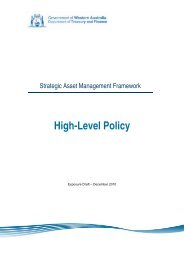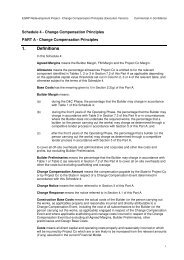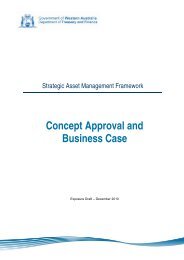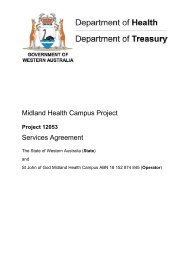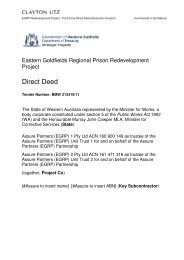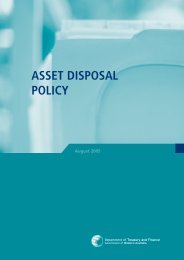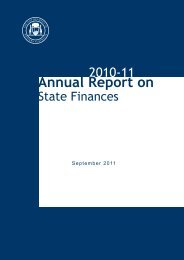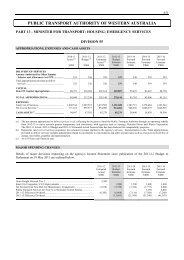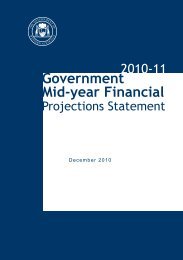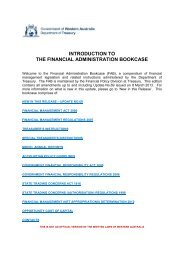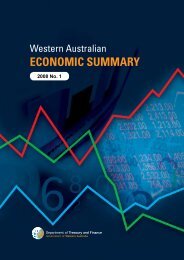No. 3 - Department of Treasury - The Western Australian Government
No. 3 - Department of Treasury - The Western Australian Government
No. 3 - Department of Treasury - The Western Australian Government
You also want an ePaper? Increase the reach of your titles
YUMPU automatically turns print PDFs into web optimized ePapers that Google loves.
<strong>Western</strong> <strong>Australian</strong> Economic Summary2006 <strong>No</strong>.3Australia’s other mining States and Territories also fare well, but even with afavourable shift in the terms <strong>of</strong> trade, consumption in less resource-orientedeconomies – particularly Victoria and South Australia – falls relative to thebase case. For Australia as a whole, GDP increases marginally under thismodelling scenario (by 0.1% in 2024-25). However, the increase in householdconsumption and welfare is noticeably higher, again reflecting terms <strong>of</strong>trade effects.Summary and Conclusions<strong>The</strong> main purpose <strong>of</strong> this paper is to explore the apparent paradox <strong>of</strong> strongeconomic growth but weak productivity growth in <strong>Western</strong> Australia in thecontext <strong>of</strong> the resources boom, and in particular what these trends mightmean for the economic welfare <strong>of</strong> the <strong>Western</strong> <strong>Australian</strong> community.Its key findings are that weak overall productivity growth in<strong>Western</strong> Australia is almost certainly linked to the decline in mining sectorproductivity in recent years. Much <strong>of</strong> that decline is probably a temporaryeffect, as lags and long lead-times in capacity expansion mean that stronggrowth in mining investment has yet to result in strong growth in thevolume <strong>of</strong> outputs. At least some <strong>of</strong> the drop in productivity may bepermanent, however, as high prices have also made it pr<strong>of</strong>itable to exploitmore marginal and costly resources, so the average level <strong>of</strong> outputs relativeto inputs has fallen.However, from the point <strong>of</strong> view <strong>of</strong> the community’s capacity to consume,productivity and output growth are currently telling only part <strong>of</strong> the story.<strong>The</strong> same phenomenon that had induced the mining sector’s apparent loss<strong>of</strong> productivity – namely strong commodity prices – has also induced asharp increase in the terms <strong>of</strong> trade. This means that <strong>Western</strong> Australia’straded outputs can be exchanged for a larger volume <strong>of</strong> goods and services,so consumption possibilities are greatly enhanced.<strong>The</strong> question <strong>of</strong> whether <strong>Western</strong> Australia’s productivity paradox is atemporary oddity or a long-term phenomenon will depend on thelonger-term path <strong>of</strong> commodity prices. Several possible price paths arediscussed, but if the IMF and World Bank are right, prices will drop fromrecent highs, but not revert to pre-boom lows. Abstracting fromtechnological progress, such a sustained increase demand could induce apermanent one-<strong>of</strong>f reduction in mining sector productivity, with higherprices and demand encouraging producers to exploit more remote and lessproductive deposits.However, a permanent shift in relative prices due to a sustained increase indemand could nonetheless generate significant welfare gains in<strong>Western</strong> Australia. <strong>The</strong> DTF’s modelling suggests that an increase inresource prices could improve welfare in resource export-orientedeconomies even if mining sector productivity falls, if the fall in productivityis demand driven (and universal). In other words, there can be acounter-intuitive situation where an economy-wide reduction inproductivity is associated with positive welfare outcomes.72 <strong>Department</strong> <strong>of</strong> <strong>Treasury</strong> and Finance



